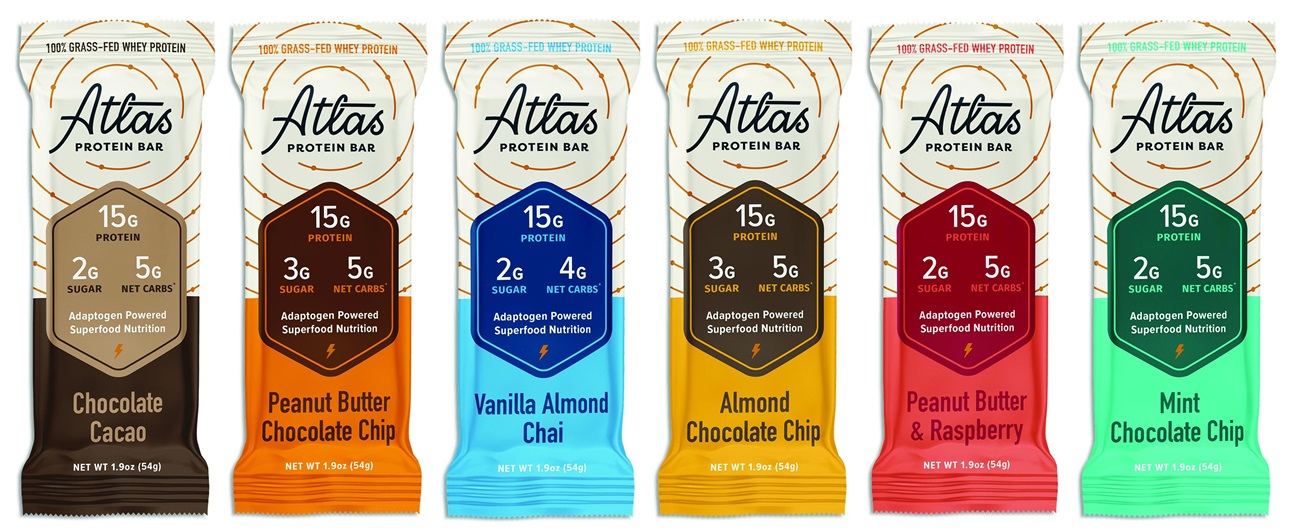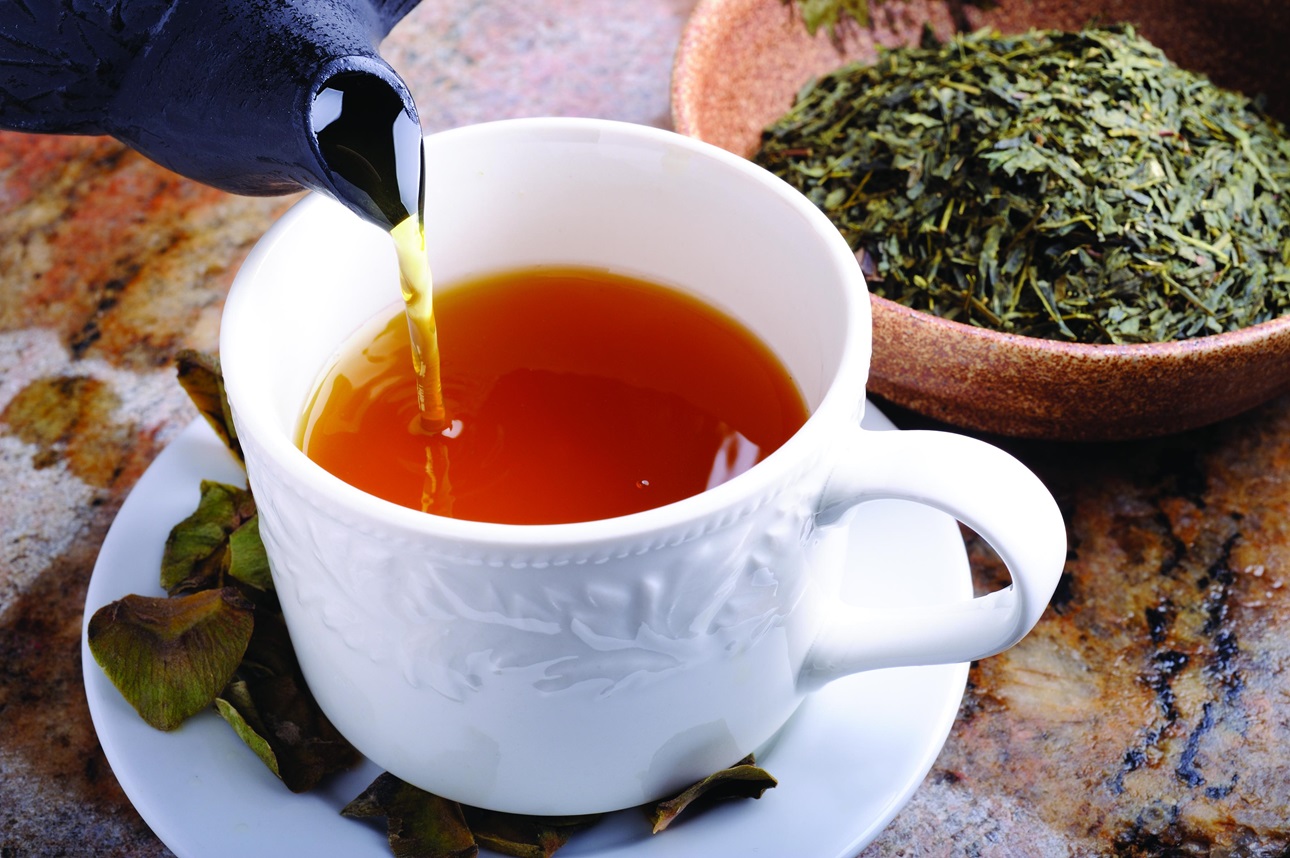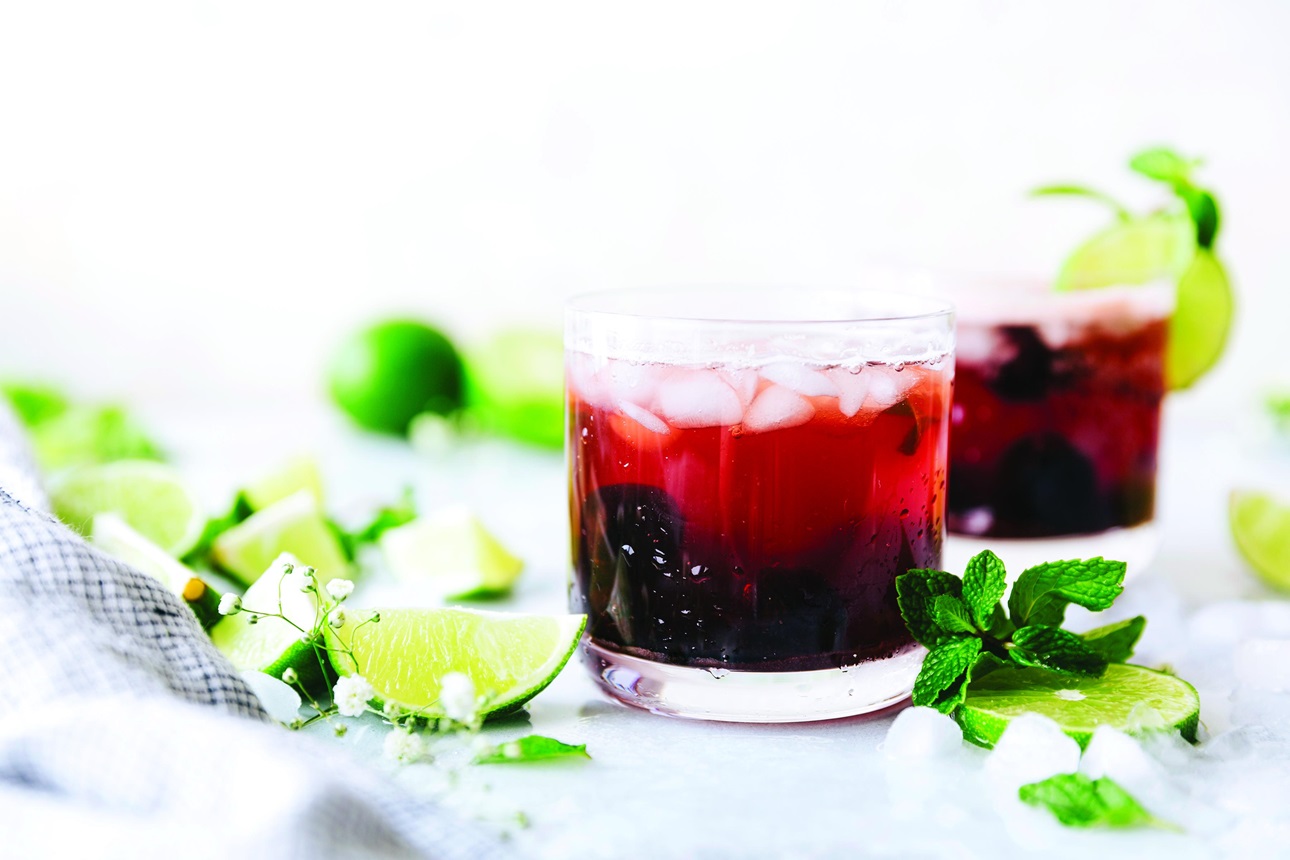Stress Soothers
NUTRACEUTICALS
Stress is a part of life that everyone experiences. Today, however, it seems that stress is increasing and having greater negative effects on people of all ages. Last year, Americans reported feeling stress, anger, and worry at the highest levels in a decade, according to a Gallup poll of more than 150,000 people around the world.
Stress affects people in a variety of ways, from lack of productivity and anxiety to fatigue, weakened immune systems, and sleep disorders. Chronic stress left unmanaged can contribute to many health problems, such as high blood pressure, heart disease, and obesity.
A growing number of foods and beverages are being introduced that claim to help relieve stress or provide a sense of relaxation for those who need a break from stress. They include ingredients such as milk peptides, botanicals, melatonin, fruits, and probiotics. Here is a look at some of these stress relievers.
Botanicals and Adaptogens
Atlas Bar in October debuted a brand makeover that included new packaging, logo, tagline, website, and formulations. Atlas Protein Bars are keto-friendly, low-carb protein bars. The updated formulation adds another layer of functionality with adaptogens, natural substances that may help the body adapt to stress and reduce fatigue. The Atlas Protein Bars contain a blend of the adaptogens ashwagandha and maca root that are said to help the body adapt to stress, fight fatigue, and boost endurance at the cellular level.
Ashwagandha is an adaptogenic herb. Lopresti et al. (2019) suggested that ashwagandha’s stress-relieving effects may occur via its moderating effect on the hypothalamus-pituitaryadrenal axis. The study involved 60 stressed, healthy adults who were randomly allocated to take either 240 mg of a standardized ashwagandha extract or a placebo once daily. The results showed that ashwagandha supplementation was associated with a statistically significant reduction in the Hamilton Anxiety Rating Scale and a near-significant reduction in the Depression, Anxiety, and Stress Scale compared to the placebo.
Maca root contains flavonoids that are thought to help promote a more balanced mood. Two separate studies demonstrated that consuming maca root has an effect on reducing symptoms of depression and anxiety in postmenopausal women (Stojanovska et al. 2015 and Brooks et al. 2008).
PLT Health offers Zembrin, a plant extract derived from a controlled cultivation of the Sceletium tortuosum herb. It is a patented botanical ingredient based on years of documented indigenous use for its stress-relieving and mood-enhancing effects. A recent trial used magnetic resonance imaging technology to study the effects of the ingredient on the “threat circuitry” of the human brain. The double-blind placebo-controlled crossover trial showed that 25 mg of Zembrin reduced anxiety-related activity of the amygdala and its associated anxiety circuitry within 2 hours of administration, according to information from PLT Health. The results provided the first evidence of the areas in the brain where Zembrin acts, and confirmation of the potential for Zembrin to help in the management of stress. Zembrin has self-GRAS status in the United States.
Safr’Inside is an encapsulated saffron extract from Activ’Inside. It is obtained through the patent pending Tech’care extraction process, where saffron volatile metabolites are surrounded by the carrier matrix, protecting them from heat and alterations. Safr’Inside may help support emotional health and improve sleep quality. It is believed to have dual actions: to control cortisol secretion and balance neurotransmitters (serotonin and gamma-aminobutyric acid).
Consumer interest in adaptogenic mushrooms is growing. To be identified as an adaptogenic substance, a mushroom must help the body adapt to stress and provide a normalizing effect on it. “What we’re finding,” says Becca Henrickson, marketing manager at Wixon, “is that as more consumers seek out plantbased alternatives to meat products and healthier food options, mushrooms can provide the desired texture and health halo they want. Mushrooms are widely known for their earthy and umami-rich flavor, but their popularity is fast-growing for their associated health benefits and meat-like texture, as well.”
Reishi mushrooms are one of the more popular adaptogenic mushrooms and are thought to help relieve stress and anxiety. Within the mushroom, there are several molecules, including triterpenoids, polysaccharides, and peptidoglycans, that may be responsible for its health effects. Other mushrooms like shiitake and maitake may help support immune health.
“Looking at these adaptogenic mushrooms from a culinary perspective allowed us to really discover their possibilities,” explains Ryan Kukuruzovic, corporate chef at Wixon. “We were able to use the expected earthy, umami-rich flavors in a range of savory applications from meatballs to pizza crusts and even savory oatmeal. But what’s really fascinating is accentuating some of the naturally sweet notes of the mushrooms in ice cream, beverages, and cookies. With our flavor masking expertise and technology, we’re able to maximize desirable flavors and minimize or eliminate unwanted ones to create fantastictasting products with better-for-you benefits in myriad applications with these mushrooms.”
L-Theanine
Teas like chamomile, lavender, and green tea are widely consumed for relaxation and sleep. A pioneer in the science of green tea, Taiyo found that the relaxation effect of green tea is due to the presence of the amino acid L-theanine, which is naturally found in tea leaves and the black and green teas brewed from them.
Suntheanine is the trade name for Taiyo’s patented pure form of L-theanine. It is not an extract of green tea, but rather is produced via a patented process that mimics the natural process in tea leaves, resulting in a 100% pure L-isomer-theanine. Clinical research suggests that 50 mg to 200 mg of Suntheanine stimulates activity in the brain known as alpha waves, which are associated with a relaxed but alert mental state. Additional human clinical research suggests that Suntheanine may play a role in improving the quality of sleep. Rao et al. (2015) showed that taking 200 mg of L-theanine before bed may support improved sleep quality not by sedation but through anxiolysis via the induction of alpha brain waves. Anxiolysis is required for the initiation of high-quality sleep.
Yeast Beta-Glucan Extract
Too much stress or prolonged stress can suppress the immune system, which enhances the risk of illness. Wellmune, a proprietary natural yeast beta-glucan extract from Kerry, has been shown to help the immune system in people who are stressed.
The ingredient triggers human immune defense systems by priming neutrophils, the most abundant immune cells in the body. Talbott and Talbott (2012) demonstrated that daily dietary supplementation with Wellmune reduced upper respiratory symptoms and improved mood state in stressed subjects. The subjects in the study were healthy women with moderate levels of psychological stress. They consumed either 250 mg of Wellmune or a placebo daily for 12 weeks. The subjects who consumed the Wellmune reported fewer upper respiratory symptoms, better overall well-being, and superior mental/physical energy levels compared to those who took the placebo.
Milk Peptides
Ingredia offers Lactium, a milk protein hydrolysate that contains a bioactive decapeptide called alpha-casozepine, which is believed to be naturally released in babies who just consumed milk. Recommended for people susceptible to stress, Lactium has been shown to have soothing and relaxing properties. Kim et al. (2019) suggested that Lactium may improve sleep quality in a study of 48 subjects who exhibited a mild to moderate degree of sleep disturbance.
Participants were asked to record 8 weeks of a sleep diary regarding the times when they went to sleep and woke up, in order to determine time in bed, time taken to fall asleep, subjective total sleep time, number and time of each waking after sleep onset, reasons for such disruptions, and their feelings in the morning. Daily sleep diary data were averaged for one week, and sleep efficiency was calculated as the percentage of subjective total sleep time compared to total time in bed. Based on the diaries, overall perceived sleep profiles were significantly improved, represented by increased total sleep time and sleep efficiency, as well as decreased sleep latency and waking after sleep onset.
Blueberries and Cherries
Tart cherries are a source of melatonin, which is believed to help aid in regulating the sleep-wake cycle. Howatson et al. (2012) examined if ingesting tart cherry juice concentrate would increase the urinary melatonin levels in healthy adults and improve sleep quality. In a randomized, double-blind, placebo-controlled, crossover design, 20 subjects consumed either tart cherry juice concentrate or a placebo for 7 days. Total melatonin content was significantly elevated in those who consumed the tart cherry juice. There were significant increases in time in bed, total sleep time, and sleep efficiency in those subjects as well. In another study on the effects of tart cherries on the sleep-wake cycle, Losso et al. (2018) showed that consuming 240 milliliters of tart cherry juice two times a day increased sleep time and sleep efficiency in a group of subjects older than 50 years with insomnia.
Guo et al. (2017) showed that blueberries may protect against the cognitive impairment induced by chronic mild stress in rats. The rats were randomly divided into four groups: control, stress, control + 5% blueberry drink, and stress + 5% blueberry drink. Cognitive performance impairment was significantly improved with blueberry drink supplementation compared to the control group. The concentrations of plasma norepinephrine and dopamine were decreased by the chronic stress but improved with the blueberry drink supplementation.
Probiotics and Prebiotics
Normally associated with immune and gut health, prebiotics and probiotics may also play a role in relieving stress, according to researchers.
One study showed that consuming probiotics may have a positive effect on psychological symptoms of depression, anxiety, and perceived stress in healthy adults (McKean et al. 2017). The researchers conducted a systematic review of relevant studies that measured preclinical psychological symptoms of depression, anxiety, and perceived stress in healthy subjects pre- and postsupplementation with a probiotic. They said that seven studies met the inclusion criteria and provided data for nine comparisons. The meta-analysis showed that supplementation with probiotics resulted in a statistically significant improvement in psychological symptoms compared with a placebo.
Another study showed that a prebiotic, Bimuno galactooligosaccharides (B-GOS) from Clasado BioSciences, may have the potential to help in stressrelated disorders (Schmidt et al. 2015). The researchers looked at the effects of fructooligosaccharides (FOS) and B-GOS on the secretion of the stress hormone, cortisol, and emotional processing in 45 healthy subjects. The subjects received one of two prebiotics or a placebo daily for 3 weeks. The salivary cortisol awakening response was significantly lower in subjects after taking B-GOS compared with the placebo. The subjects also showed decreased attentional vigilance to negative versus positive information in a dot-probe task after taking B-GOS compared to the placebo. No effects were found after the administration of FOS.
Next month’s Nutraceuticals section will discuss ingredients that may help maintain a healthy microbiome.
R E F E R E NC E S
Brooks, N. A., G. Wilcox, K. Z. Walker, et al. 2008. “Beneficial Effects of Lepidium meyenii (Maca) on Psychological Symptoms and Measures of Sexual Dysfunction in Postmenopausal Women are not Related to Estrogen or Androgen Content.” Menopause 15(6): 1157–1162.
Guo, Q., Y.-N. Kim, and B. H. Lee. 2017. “Protective Effects of Blueberry Drink on Cognitive Impairment Induced by Chronic Mild Stress in Adult Rats.” Nutr. Res. Pract. 11(1): 25–32.
Howatson, G., P. G. Bell, J. Tallent, et al. 2012. “Effect of Tart Cherry Juice (Prunus cerasus) on Melatonin Levels and Enhanced Sleep Quality.” Eur. J. Nutr. 51(8): 909–916.
Kim, H. J., J. Kim, S. Lee, et al. 2019. “A Double-Blind, Randomized, Placebo- Controlled Crossover Clinical Study of the Effects of Alpha-s1 Casein Hydrolysate on Sleep Disturbance.” Nutrients. 11(7): 1466.
Lopresti, A. L., S. J. Smith, H. Malvi, et al. 2019. “An Investigation into the Stress-relieving and Pharmacological Actions of an Ashwagandha (Withania somnifera) Extract: A Randomized, Double-blind, Placebo-controlled Study.” Medicine. 98(37): e17186.
Losso, J. N., J. W. Finley, N. Karki, et al. 2018. “Pilot Study of the Tart Cherry Juice for the Treatment of Insomnia and Investigation of Mechanisms.” Amer. J. Ther. 25(2): e194–e201. McKean, J., H. Naug, E. Nikbakht, et al. 2017. “Probiotics and Subclinical Psychological Symptoms in Healthy Participants: A Systematic Review and Meta-Analysis.” J. Altern. Complement Med. 23(4): 249–258.
Rao, T. P., M. Ozeki, and L. R. Juneja. 2015. “In Search of a Safe Natural Sleep Aid.” J. Amer. Coll. Nutr. 34(5): 436–447.
Schmidt, K., P. J. Cowen, C. J. Harmer, et al. 2015. “Prebiotic Intake Reduces the Waking Cortisol Response and Alters Emotional Bias in Healthy Volunteers.” Psycopharmacology 232(10): 1793–1801.
Stojanovska, L., C. Law, B. Lai, et al. 2015. “Maca Reduces Blood Pressure and Depression, in a Pilot Study in Postmenopausal Women.” Climacteric 18(1): 69–78.
Talbott, S. M., and J. A. Talbott. 2012. “Baker’s Yeast Beta-Glucan Supplement Reduces Upper Respiratory Symptoms and Improves Mood State in Stressed Women.” J. Amer. Coll. Nutr. 31: 295–300.








